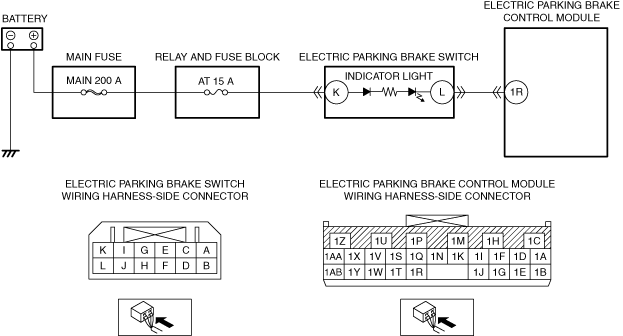 |
ac9wzw00005230
ELECTRIC PARKING BRAKE SWITCH INDICATOR LIGHT IS ON OR OFF CONSTANTLY [ELECTRIC PARKING BRAKE]
id040328250400
Description
Possible Cause
System Wiring Diagram
ac9wzw00005230
|
Diagnostic Procedure
|
Step |
Inspection |
Action |
|
|---|---|---|---|
|
1
|
VERIFY ALL SYSTEM DTCs
• Switch the ignition OFF.
• Switch the ignition ON (engine off or on) and wait for 10 s or more.
• Perform a CMDTC self-test using the M-MDS.
• Are any DTCs displayed?
|
Yes
|
Repair or replace the malfunctioning part according to the applicable DTC troubleshooting.
|
|
No
|
Go to the next step.
|
||
|
2
|
VERIFY IF THE ELECTRIC PARKING BRAKE WARNING LIGHT IS TURNED ON
• Verify if the electric parking brake warning light is turned on.
• Is the electric parking brake warning light turned on?
|
Yes
|
Perform an inspection referring to “ELECTRIC PARKING BRAKE WARNING LIGHT TURNS ON”.
|
|
No
|
Go to the next step.
|
||
|
3
|
INSPECT ELECTRIC PARKING BRAKE SWITCH CONNECTOR CONDITION
• Switch the ignition OFF.
• Disconnect the negative battery terminal.
• Disconnect the electric parking brake switch connector.
• Inspect the connector engagement and connection condition and inspect the terminals for damage, deformation, corrosion, or disconnection.
• Is the connector normal?
|
Yes
|
Go to the next step.
|
|
No
|
Repair or replace the connector.
|
||
|
4
|
VERIFY ELECTRIC PARKING BRAKE CONTROL MODULE POWER SUPPLY VOLTAGE
• Verify that the electric parking brake switch connector is disconnected.
• Connect the negative battery terminal.
• Measure the voltage at the electric parking brake switch terminal K (wiring harness-side).
• Is the voltage B+?
|
Yes
|
Go to the next step.
|
|
No
|
Inspect the AT 15 A fuse and MAIN 200 A fuse.
• If the fuse is blown:
• If the fuse is damaged:
• If the fuse is normal:
|
||
|
5
|
INSPECT ELECTRIC PARKING BRAKE SWITCH
• Inspect the electric parking brake switch.
• Is the electric parking brake switch normal?
|
Yes
|
Go to the next step.
|
|
No
|
Replace the electric parking brake switch.
|
||
|
6
|
INSPECT ELECTRIC PARKING BRAKE CONTROL MODULE CONNECTOR CONDITION
• Switch the ignition OFF.
• Disconnect the negative battery terminal.
• Disconnect the electric parking brake control module connector.
• Inspect the connector engagement and connection condition and inspect the terminals for damage, deformation, corrosion, or disconnection.
• Is the connector normal?
|
Yes
|
Go to the next step.
|
|
No
|
Repair or replace the connector.
|
||
|
7
|
INSPECT ELECTRIC PARKING BRAKE SWITCH CIRCUIT FOR SHORT TO GROUND
• Verify that the electric parking brake switch and electric parking brake control module connectors are disconnected.
• Inspect for continuity between electric parking brake switch terminal L (wiring harness-side) and body ground.
• Is there continuity?
|
Yes
|
Refer to the wiring diagram and verify whether or not there is a common connector between electric parking brake switch terminal L and electric parking brake control module terminal 1R.
If there is a common connector:
• Determine the malfunctioning part by inspecting the common connector and the terminal for corrosion, damage, or pin disconnection, and the common wiring harness for a short to ground.
• Repair or replace the malfunctioning part.
If there is no common connector:
• Repair or replace the wiring harness which has a short to ground.
|
|
No
|
Go to the next step.
|
||
|
8
|
INSPECT ELECTRIC PARKING BRAKE SWITCH CIRCUIT FOR OPEN CIRCUIT
• Verify that the electric parking brake switch and electric parking brake control module connectors are disconnected.
• Inspect the wiring harness for continuity between electric parking brake switch terminal L (wiring harness-side) and electric parking brake control module terminal 1R (wiring harness-side).
• Is there continuity?
|
Yes
|
Replace the electric parking brake control module.
|
|
No
|
Refer to the wiring diagram and verify whether or not there is a common connector between electric parking brake switch terminal L and electric parking brake control module terminal 1R.
If there is a common connector:
• Determine the malfunctioning part by inspecting the common connector and the terminal for corrosion, damage, or pin disconnection, and the common wiring harness for an open circuit.
• Repair or replace the malfunctioning part.
If there is no common connector:
• Repair or replace the wiring harness which has an open circuit.
|
||